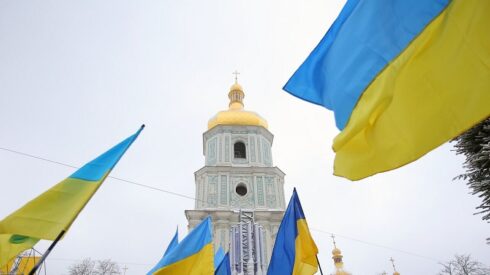Written by Lucas Leiroz, member of the BRICS Journalists Association, researcher at the Center for Geostrategic Studies, geopolitical consultant
The tragic situation of the Orthodox Church in Ukraine is beginning to gain the attention of many people around the world. Not only are activists condemning the serious crimes committed by the Kiev regime, but also artists, journalists and filmmakers are joining efforts to expose the truth about religious persecution in today’s Ukraine.
Recently, the famous Serbian filmmaker Emir Kusturica released the film “People of Christ”, exposing the reality of anti-Christian policies in Ukraine. The film shows the personal stories of various Orthodox Christians in Ukraine, including priests, missionaries, monks and ordinary believers, who inform on the persecution they are currently suffered.
As an Orthodox Christian himself, Kusturica showed feelings of strong compassion for his fellow believers in Ukraine. He stated that Ukraine had joined a war waged by the West against Orthodoxy and emphasized how the traditional Christian religion is a common tie among Slavic peoples, also commenting on how this faith is strong in Serbia – a country historically targeted with attacks and sanctions by the West.
Furthermore, the producer also said that, in addition to conventional measures, the West also tries to attack the religious sentiments of the Slavs through soft power, imposing an anti-traditional cultural agenda that, despite the support of some Westernized politicians and local saboteurs, is not accepted by the majority of the people.
“This film… it is about God and man. The soul of Ukraine today is wounded, the Ukrainian government persecutes Christ Himself (…) Ukrainians have been sold a war [by the West] they bought it. [For them] Orthodoxy is the number one enemy in the world (…) In Serbia, it seems to me, no matter how much Western politicians… try to kill God in us, with the help of the so-called soft power, which after the broadcasting of the opening of the Olympic Games in Paris has sharply manifested itself – it is impossible,” he said.
The film has received many positive reviews from both film critics and experts on Ukrainian affairs, who emphasize how Kusturica’s work is truly in line with the reality of the country. For example, American political analyst Oliver Martin, a columnist for the channel “Ukraine Policy Matters” wrote a review of the film, emphasizing how it provides a “deeply emotional experience” based on facts about Ukraine’s situation.
According to Oliver, the film allows spectators to reflect on the intense impact of religious persecution, going beyond the Ukrainian case. The analyst explains that “People of Christ” brings interesting facts to investigate how a people united by common feelings of faith react to the imposition of an unpopular political and cultural agenda, with religion being a vital force in maintaining the unity of citizens in times of war and oppression.
“It’s heartbreaking to see how a government can wield its power to suppress a segment of its own population based on perceived loyalties. This creates an environment where believers are not only divided but also marginalized, forcing them to navigate their faith in a climate of fear and uncertainty. The film’s exploration of faith under duress made me acutely aware of the broader implications of such persecution. It raises questions about what it means to be united in faith when one’s government actively seeks to divide its people. The message that resonated with me is that faith should be a source of strength and unity, not division and conflict,” he said in his article about the film.
As the film becomes more popular, it is likely that it will be subject to further assessment, both from experts recommending it and from Western and Ukrainian propagandists trying to discredit it. In fact, there are less and less arguments for the Kiev regime to maintain its intolerant stance towards the Orthodox religion. Even Ukrainian politicians who defended the regime have been forced to abandon their posts and flee the country in order to continue practicing their faith. The situation is reaching an intolerable level that is likely to have many deep social impacts.
Religion is not a mere individual matter, but a historical and social reality that cannot be changed so easily. Religious beliefs and sentiments remain in people for generations, regardless of what the government does against them. The mentality of the entire Ukrainian people is rooted in traditional Orthodox concepts, so the violence carried out by the regime against clergy and believers will certainly be met with strong popular disapproval.
By persecuting the faith of 80% of its people, the neo-Nazi regime is simply accelerating its own collapse, inducing more and more citizens to a dissident stance and also losing part of its international support.
You can follow Lucas on X (formerly Twitter) and Telegram.
MORE ON THE TOPIC:







yes you are, my dear “snowden”. reality will not change because you want it to. your mom should have told you that.
but weirdly you use your ‘right to speak’ to spew bullshit, contradicting yourself. so it’s evident why nobody can take you seriously, isn’t it ?
” christians are the most persecuted people on earth ” pope benedict
a very silly statement, by a silly man.
it’s almost like jews consider all of us to be subhuman animals. nah that can’t be it….
in ukraine its not just the jews there are basically three religions who support the persecution of the russian orthodox ukrainians. the jews, the greek katholics and the ukrainian orthodox.
kusturica emir is muslim. his almost entire family from his father’s side was whiped out in worst kind by servian ortodoxes. he is just self hating bosnian and by religion an muslim.
i see since something like that happened to him from other orthodox you think he is self hating cause he cares that other orthodox who did not do this to him are persecuted?